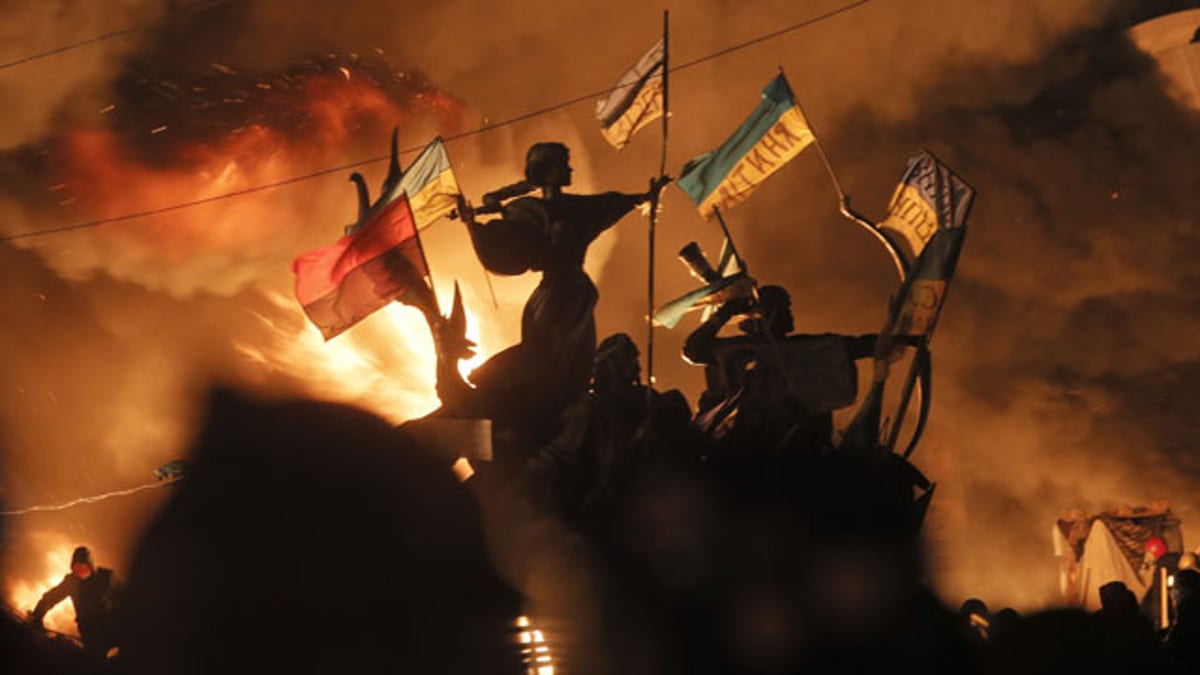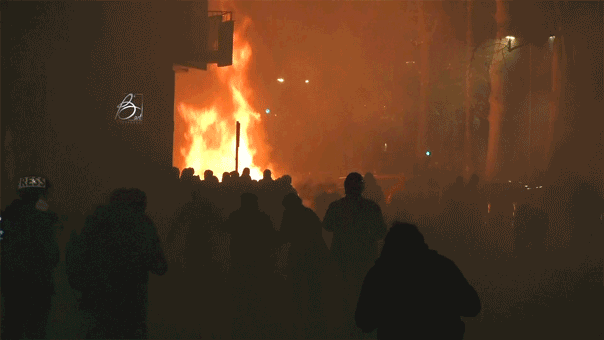
February 18, 2014: Monuments to Kiev's founders burn as anti-government protesters clash with riot police in Independence Square, the epicenter of Ukraine's current unrest. (AP)
BRUSSELS – The deadly clashes in Ukraine's capital have drawn sharp reactions from Washington, sparked a rapidly growing push for European Union sanctions and led to a Kremlin statement blaming Europe and the West. A roundup of some of the international reactions:
EUROPEAN UNION
EU Commission President Jose Manuel Barroso on Wednesday expressed "shock and utter dismay" at the violence in Kiev, blamed Ukraine's "political leadership" and predicted the 28-nation EU will impose sanctions as a result. "We therefore expect that targeted measures against those responsible for violence and use of excessive force can be agreed by our member states as a matter of urgency, as proposed by the high representative/vice president (top EU diplomat Catherine Ashton)," Barroso said in a statement. EU foreign ministers were summoned to an emergency meeting in Brussels on Thursday afternoon to decide on the bloc's course of action on Ukraine.
UNITED STATES
Vice President Joe Biden called Ukraine's president, Viktor Yanukovych, to express "grave concern" and to request the pullback of government forces and the exercise of maximum restraint. The White House said Biden made clear that while the United States condemns violence by all parties, the government bears "special responsibility to de-escalate the situation." Biden also called on Ukraine's government to address the protesters" "legitimate grievances" and put forward proposals for political reform.
RUSSIA
The Russian Foreign Ministry blamed the West for the escalation of violence and called on the Ukrainian opposition to work with the government to find an exit from the crisis. "What is happening is a direct result of the conniving politics of Western politicians and European bodies," the ministry said in a statement.
GERMANY
Germany's leaders had refused to back Washington's calls for sanctions against Ukraine's government to pressure it into accepting opposition demands for reforms. But on Wednesday, a senior lawmaker with Chancellor Angela Merkel's conservative party, Andreas Schockenhoff, said EU-wide measures such as the freezing of bank accounts and entry bans had become necessary. Schockenhoff also said "Yanukovych clearly bears responsibility for the escalation of violence."
A statement issued by Germany's Foreign Ministry Wednesday, however, did not mention sanctions. It quoted Foreign Minister Frank-Walter Steinmeier as calling the outbreak of violence "appalling" and the high number of victims "terrible." Steinmeier said that "a pause for breath is urgently needed" and called on all concerned not to use force -- "that goes for the security forces but also for the radical elements among the demonstrators."
FRANCE
President Francois Hollande expressed "deep indignation" at the violence in Ukraine during a meeting of the French Cabinet on Wednesday, government spokeswoman Najat Vallaud-Belkacem said. "Everything must be done to stop the violence (in Ukraine). Some individual sanctions must be considered by the EU", Hollande was also quoted as saying.
French Foreign Affairs Minister Laurent Fabius said there will be "deliberation with our German friends and probably sanctions."
SWEDEN
Swedish Foreign Minister Carl Bildt said in a Twitter post on Wednesday: "We must be clear: Ultimate responsibility for deaths and violence is with President Yanukovych. He has blood on his hands."
POLAND
Prime Minister Donald Tusk told his country's parliament Wednesday that the time has come to impose sanctions on Ukraine, news reports from Warsaw said.
DENMARK
"The Ukrainian government must take responsibility to immediately enter a serious dialogue with the opposition on the need for constitutional amendments, a new broad-based government and the preparation of democratic and fair presidential elections," Foreign Minister Martin Lidegaard said.
UNITED NATIONS
U.N. Secretary-General Ban Ki-moon expressed shock at the "unacceptable" violence and called for "the immediate renewal of genuine dialogue leading to rapid results," U.N. spokesman Martin Nesirky said. "Preventing further instability and bloodshed is a paramount priority."








































